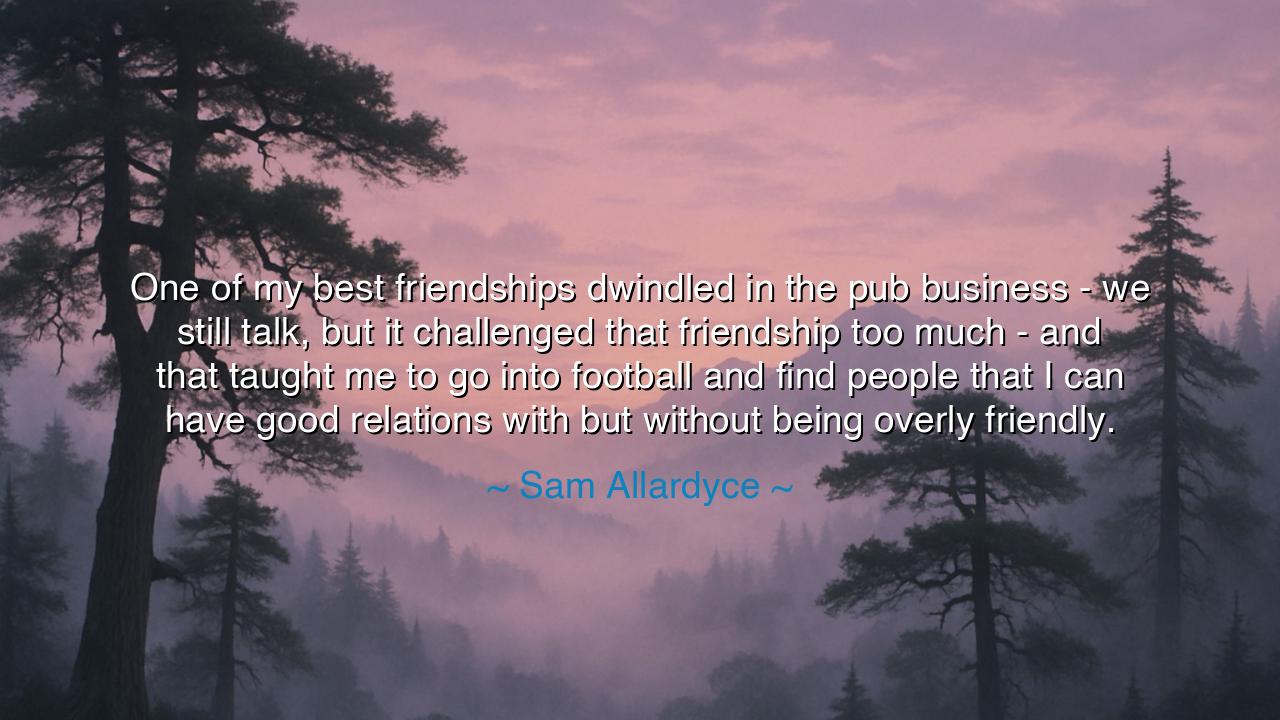
One of my best friendships dwindled in the pub business - we
One of my best friendships dwindled in the pub business - we still talk, but it challenged that friendship too much - and that taught me to go into football and find people that I can have good relations with but without being overly friendly.






In the wise and reflective words of Sam Allardyce, a man seasoned by the storms of both sport and life, we hear a truth that speaks not only to the heart of competition, but to the fragile nature of human bonds: “One of my best friendships dwindled in the pub business — we still talk, but it challenged that friendship too much — and that taught me to go into football and find people that I can have good relations with but without being overly friendly.” Beneath these words lies the hard-earned wisdom of experience — the understanding that even the strongest friendship can wither when weighed against ambition, business, or the pressures of leadership. Allardyce’s reflection is not bitter, but tempered — the voice of one who has learned that balance is the guardian of both success and peace of mind.
In his youth, Allardyce ventured beyond the pitch, taking part in the world of business, seeking prosperity in a field far from football. There, he discovered what countless others have before him: that when money and friendship mix, the bond between souls can fray beneath the strain of conflicting loyalties. Where once there was trust, suspicion creeps in; where once there was laughter, silence lingers. The pub business, in Allardyce’s telling, became not a symbol of fellowship, but a crucible that tested it — and found it wanting. Though his friendship survived in form, it had been changed forever, its intimacy replaced by a cautious distance. From this, he drew a lesson that would shape his life as a manager and leader: that one must learn where to draw the boundary between companionship and responsibility.
The ancients, too, knew this dilemma. In the tales of King Solomon, there is a proverb that warns, “A friend too near in business may be too near in strife.” For when men’s fortunes intertwine, their hearts are tested not by love, but by necessity. Even Julius Caesar, a leader of unmatched authority, learned this painful truth when his trust in Brutus was betrayed — not out of hatred, but out of political conviction. The blending of personal loyalty and public duty often ends in sorrow, for the heart longs for affection while the mind demands prudence. So it was for Allardyce: he saw that to lead, to build, to succeed, he must temper his warmth with wisdom, his generosity with restraint.
Yet, his words reveal not a man turned cold, but one who has mastered the art of disciplined friendship. When he says he sought “good relations” without being “overly friendly,” he speaks of the delicate balance required by all who hold authority — the capacity to care without losing clarity, to inspire without being ensnared by sentiment. In the realm of football, as in war or governance, the leader who grows too close to his men risks blindness; the one too distant risks rebellion. The greatness of Allardyce’s insight lies in his humility — he learned, through pain, that friendship is a gift that must be protected, even if it means stepping back from it.
We may recall the tale of Abraham Lincoln, who as President during America’s darkest hour filled his cabinet not with friends, but with rivals. He understood that affection could cloud judgment, but respect could sharpen it. Through this balance, he preserved unity and purpose. So too did Allardyce seek not companions who would flatter him, but colleagues who would stand beside him in truth — men with whom he could labor toward victory, bound not by personal emotion, but by shared discipline and respect.
The heart of Allardyce’s lesson is clear: not every friendship must be carried into every season of life. Some bonds are meant for youth, some for rest, and some for the lonely road of leadership. To cling to every friendship without discernment is to invite sorrow; to abandon all is to invite loneliness. The wise learn to honor friendship’s memory without forcing its presence. They learn, as Allardyce did, to build new relationships on foundations of respect rather than dependence, and to let purpose, not sentiment, guide their way.
So, O listener, take heed of this teaching: cherish your friends, but know the nature of each bond. Do not let business poison the well of affection, nor emotion weaken the pillars of duty. If you must choose, choose integrity — for friendship born of truth will endure distance, while that built on convenience will crumble under strain. Be warm, but not reckless; kind, but not blind. For in every endeavor, whether on the field, in the market, or in the heart, happiness depends not only on who walks beside you, but on how you walk together.
Thus, let Allardyce’s experience remind you that friendship and leadership are both sacred arts — each requiring courage, humility, and restraint. Raise a quiet toast to the friends who remain, forgive those who drift away, and in all your dealings, strive for balance. For the wise man, like the steady captain, knows that to steer the ship safely, one must hold the wheel firmly — even when it means letting go of the hands that once helped build it.






AAdministratorAdministrator
Welcome, honored guests. Please leave a comment, we will respond soon